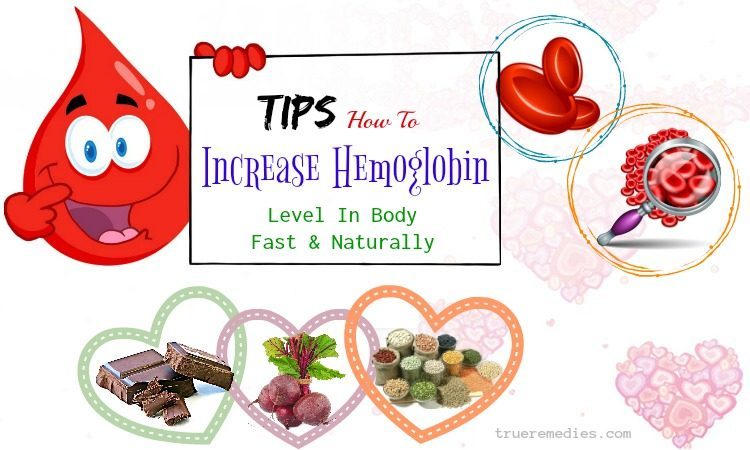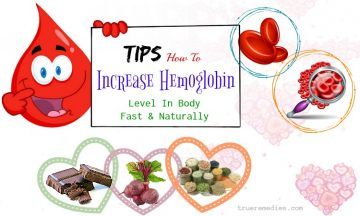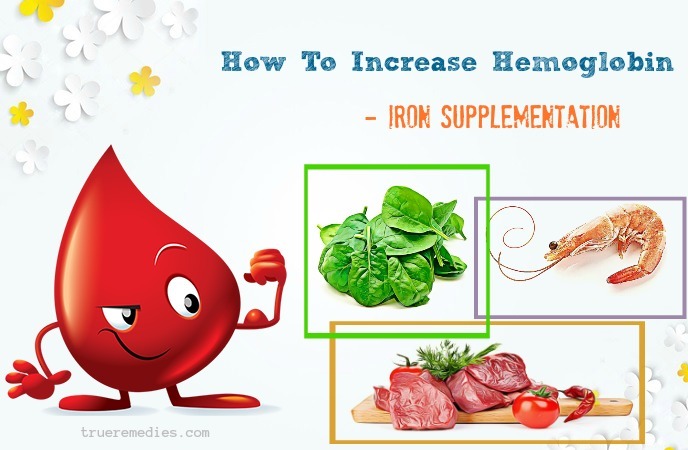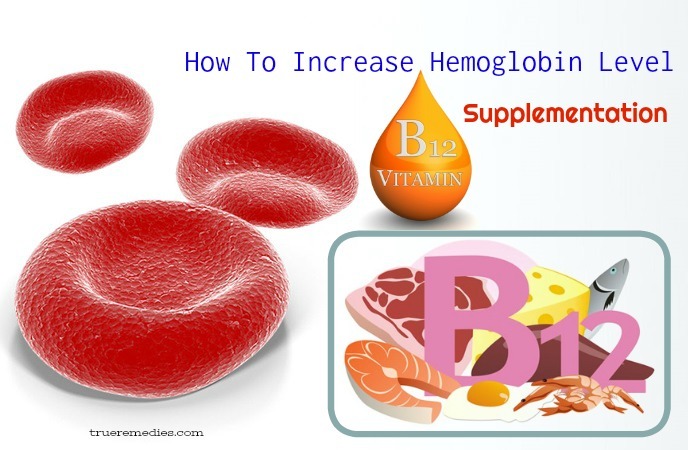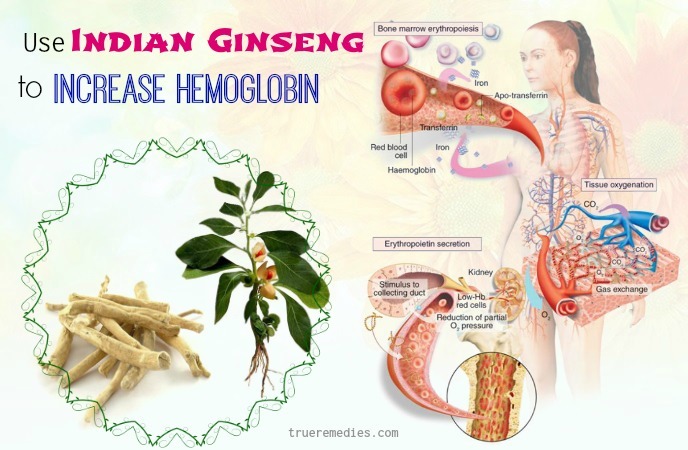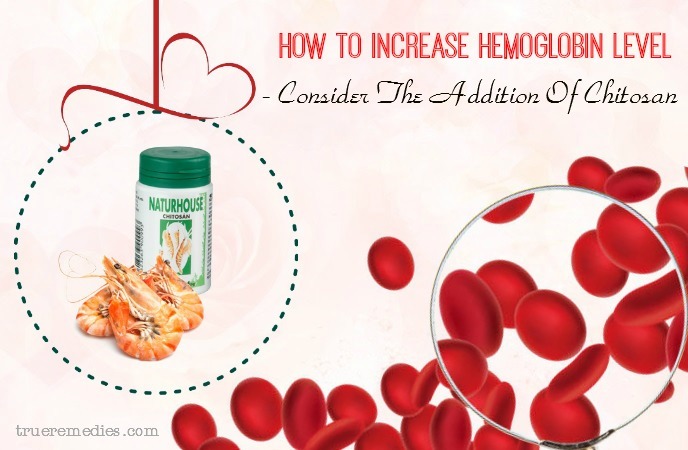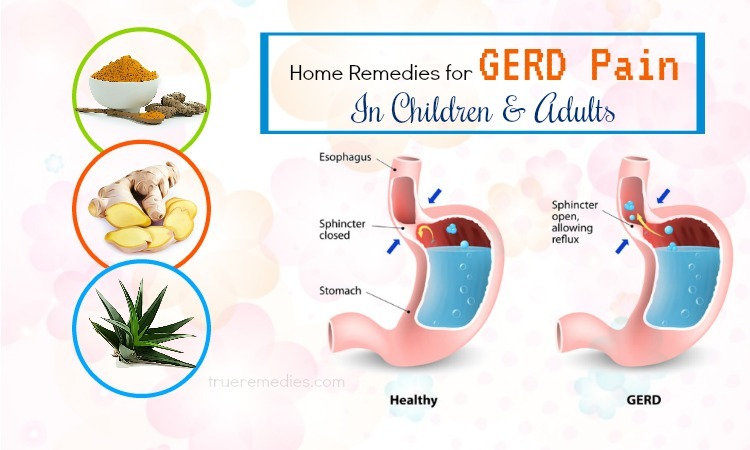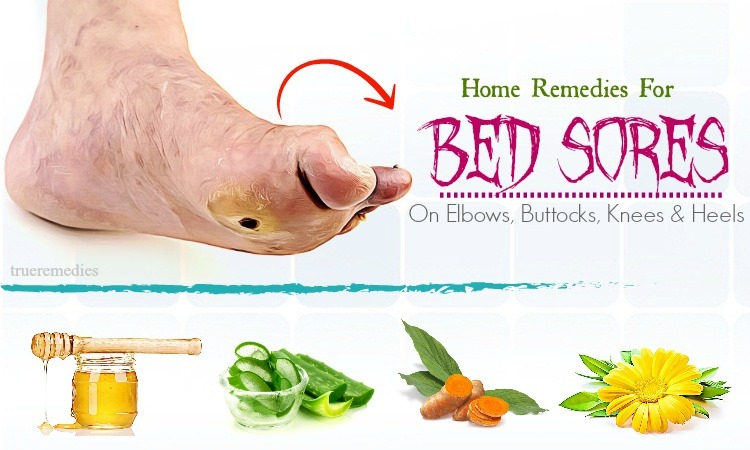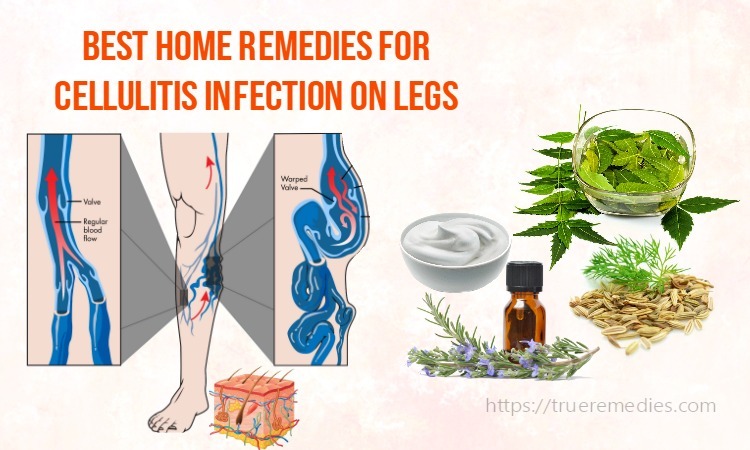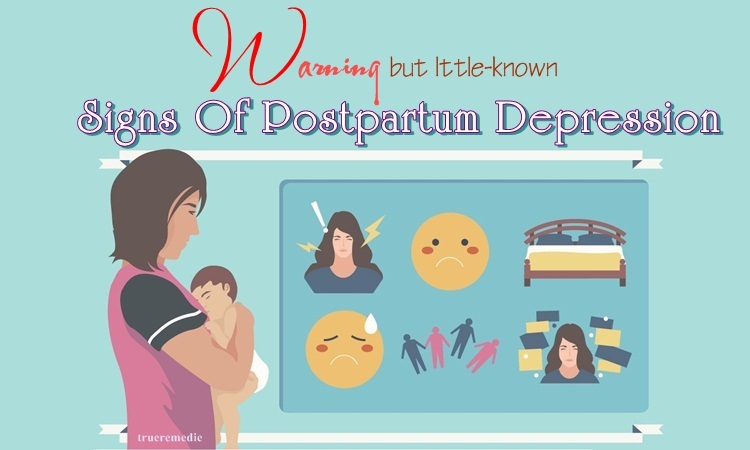Updated: 11/23/2019
Contents
Illness and fatigue can be signs of low hemoglobin levels. A lack of nutrients is the most common cause of this condition. Low hemoglobin levels are a very common condition, especially in pregnant women. Many people worry about it because it has a negative impact on the quality of life.
If the hemoglobin level is low, you can increase this level by changing diet, and applying natural therapy and medical treatments. The article below will provide you with tips to help you treat this condition. But first of all, let’s learn the basics of hemoglobin level to determine your exact situation and find the right method.
What Is Hemoglobin?
Hemoglobin is an iron-rich protein in red blood cells. Oxygen from the lungs attaches to hemoglobin in the blood. Through the blood circulation, the hemoglobin will carry oxygen to the cells and tissues in the body. Each hemoglobin protein can carry four molecules of oxygen through the bloodstream that supplies oxygen to the cells and tissues in the body. Hemoglobin also plays a role in helping red blood cells appear as a disk, allowing them to move easily through blood vessels. The main function of hemoglobin is to carry oxygen from the lungs to the cells of many different parts of the body. Another important function of hemoglobin is to transport CO2 from these cells to the lungs. Hemoglobin levels are measured by blood tests. Hemoglobin is usually measured by g / dL. Normal blood hemoglobin levels are 13.5-18 g / dL in men and 12-16 g / dL in women. In children, normal hemoglobin levels vary with age.
High hemoglobin levels (> 16.5 g / dL) may be a sign of polycythemia. Low hemoglobin level (less than 12 g / dL) indicates that you have anemia, because your body does not have enough red blood cells or cells do not function properly. Currently, low hemoglobin level is common, especially in women and children. This condition can have serious health consequences. However, this condition is often difficult to detect because many people think that its manifestation is the result of overwork. At first, anemia can be very mild and should not be noticed. But its signs and symptoms will gradually worsen if the condition continues to progress.
In any person, low hemoglobin level is very dangerous and this condition has a lot of harmful effects on their health. For normal people, when anemia is present, the oxygen-carrying capacity of red blood cells decreases, leading to hypoxia in organizations, especially in the heart, muscles, and brain, causing severe heart attacks, dizziness, and muscle weakness. For women, especially pregnant women, this condition can have very dangerous consequences. Low hemoglobin level increases the risk of preterm birth, fetal malnutrition, increased morbidity and mortality in both mothers and children during childbirth. Therefore, the timely detection and treatment of this condition is very important.
TrueRemedies Partner Solutions

Need a Help from the Leading Expert Online, Available 24/7?
They’re all here and ready to answer your questions online or by phone. Keep asking questions until you get the answer you need.
What Are Common Causes Of Low Hemoglobin Level?
Here are common causes of this condition [1]:
- Low hemoglobin level due to iron deficiency is the most common. This type of Low hemoglobin level occurs when a person does not have enough iron to produce enough hemoglobin that the body needs. Low hemoglobin level is usually due to blood loss, but it can also be due to poor body iron absorption.
- Low hemoglobin level related to pregnancy is an iron deficiency anemia, which occurs due to pregnancy and childbirth.
- Low hemoglobin level due to vitamin deficiency occurs when the body is not getting enough nutrients such as vitamin B12 or folic acid (also known as folate). This condition can alter the shape of red blood cells, which results in their poor oxygen delivery to the cells and tissues [2] [3].
- Low hemoglobin level due to varicose veins is a disorder in which the stem cells that form blood in the bone marrow are attacked by the immune system, resulting in a decrease in the number of red blood cells.
- Hemolytic hemorrhage may be a result of heredity or another condition. It occurs when red blood cells break down in the blood or spleen.
- Hemoglobin due to sickle cell anemia is a genetic condition that occurs due to abnormalities in the shape of the hemoglobin protein.
- Low hemoglobin level may also be due to other conditions, such as kidney disease and chemotherapy for cancer, which may also affect the body's ability to produce red blood cells.
Infants from 6 to 8 weeks of age may experience temporary low hemoglobin level. This situation will not affect the child unless the child is sick for some other reason.
What Are Common Symptoms Of Low Hemoglobin Level?
Here are common symptoms of this condition:
- Tired
Fatigue is usually the first sign of low hemoglobin level. It's not just a sluggish feeling after midnight or because of stress. It is another type of fatigue, many people will complain of it as fatigue from the bones.
- Pale Skin
One of the most noticeable signs of low hemoglobin level is the pallor of the skin around the eyes. This is an area that contains blood vessels, so if it's pale then it's a sign that you do not get enough red blood cells for other areas of the body. Faces, palms and nails, nails may also look pale if you get this problem.
- Shortness Of Breath
If you feel like you cannot control your breath, especially during exercise, climbing stairs or lifting something, it is a sign that the body does not receive enough oxygen. Feeling weak, head spinning and dizziness are common symptoms of this condition.
- Chest Pain
When you lie down, you can hear the drumming of your heart, which means your heart is racing to try to get more oxygen.
- Numbness
If there is a feeling of numbness or tingling in the hands and feet, it is not enough blood to feed the body.
- Appetite For Strange Food
Some people with low hemoglobin levelare always hungry and have a habit of chewing ice. Experts are still unclear the cause of this manifestation. Some people may even have the appetite for paper or clay.
- Difficulty Concentrating
If you are having trouble concentrating and remembering, it can be a sign of low hemoglobin level.
- Headaches
Frequent headaches is a common sign of low hemoglobin level.
You may experience other symptoms not mentioned. If you have any questions about the signs of the disease, please consult your doctor [4].
Who Is At High Risk Of Low Hemoglobin Level?
Anyone can get into this situation, but the following people are at higher risk:
- The elderly or those who lack iron in their diet.
- People who exercise regularly with high intensity.
- Women during menstruation or pregnant women.
- Persons with chronic health conditions, including autoimmune diseases, liver disease, thyroid disease and enteritis.
- People with lung or kidney disease.
- People often smoke, or lose water.
You can control this problem by minimizing risk factors. Please see your doctor for more information.
When To See A Doctor?
If you have any of these signs or symptoms or have any questions, please consult your doctor. Each person's condition is different, so please consult your doctor to select the most suitable option. In addition, you should see a doctor after a period of home treatment applying but no results. Then you may already have another disease.
Above are some important information you need to know about low hemoglobin level. As you can see, this condition can cause a lot of dangerous complications, so treating it should be done as soon as possible. Below, we introduce you tips to help you increase hemoglobin level. Take a look at TrueRemedies.com!
Top 20 Tips On How To Increase Hemoglobin Level In Body Fast And Naturally
1. Iron Supplementation
This is the first home remedy in this list of tips on how to increase hemoglobin level. Iron is an essential mineral, which plays a very important role in the body. Iron is a constituent of the hemoglobin of red blood cells. It combines with oxygen in the lungs to form oxygen hemoglobin (red blood cells) and when red blood cells travel through the bloodstream, it distributes oxygen to tissues (the blood turns black).In addition, iron is a constituent of myoglobin which has the function of transporting oxygen in the cell to the muscle fibers, helping the muscles to function strongly. Iron is essential for the development of children during puberty. Iron plays an important role in the production of white blood cells, which boosts the immune system. Not only that, iron also plays an important role in the development of the fetus. Therefore, women need iron supplements during pregnancy to keep their fetus healthy. For adults, the amount of iron needed for daily needs is 14mg [5].
If the hemoglobin level is low, you should increase consumption of iron-rich foods such as animal liver, meat, shrimp, beef, tofu, spinach, pineapple and nuts. Also, you can add dates, dried apricots and raisins to your diet because they are reliable sources of iron. Other great fruit sources of iron are figs and prunes. If you are in deficiency of iron, then it is a good idea to have 2-3 servings of these iron-rich foods every day.
Other great source of iron is pumpkin seeds. You may be surprised to know that just 100grams of chia or pumpkin seeds have approximately 15mg of iron. What is more, they also have good fatty acids that could make your skin glow. That is killing two birds with a single stone.
When consuming nuts, you need to be careful to avoid allergies. In fact, the addition of iron to the body is done in a variety of ways, such as boosting the intake of iron-rich foods, using iron-containing functional foods, and taking iron medication. Each way will bring about different effects after a different time. However, for anemic patients, rapid iron supplementation through the use of functional foods or iron medication is recommended. These will quickly replenish your body's iron deficiency.
You need to add about 8 to 18 mg of iron to your body every day to ensure that your iron levels are normal. Consider taking extra if you are anemic or worrying that you may be anemic. Taking iron supplements can cause some side effects, including bowel movements, stomach upset, heartburn, and constipation. The iron supplementation of the body through foods takes more time to work. However, that does not mean you should ignore it. Let’s apply it daily to support the healing process.
Learn more: 30 Home Remedies For Heavy Menstrual Bleeding Clots In Women
2. How To Increase Hemoglobin Level – Vitamin C Supplementation
This is another must-try treatment in this list of tips on how to increase hemoglobin level. Like most other vitamins, vitamin C (also known as ascorbic acid) cannot be produced by the body. Most vitamin C will be taken from the foods you eat every day. Vitamin C deficiency can lead to anemia or reduced red blood cell counts. Vitamin C helps boost the absorption of iron, which is important for the functioning of the body.
Iron helps produce hemoglobin in red blood cells to transport oxygen. Vitamin C also supports red blood cell production. Taking foods rich in vitamin C along with foods rich in iron creates an acidic environment in the stomach, helping the body to absorb iron better. Adults usually absorb 10-15% of iron from food. They will absorb heme iron (iron found in animals) and non – heme iron (iron found in plants) and absorption does not depend on the food. However, the absorption of non-heme iron is influenced by the absorption of other substances such as vitamin C. For that reason, taking vitamin C supplements is essential.
The best source of vitamin C is vegetables and fruits, especially citrus fruits. Citrus fruits include orange, grapefruit, tangerines and similar fruits. Some vegetables like cabbage, broccoli, chili, and spinach are also rich in vitamin C. Berries, such as strawberries, cherries, blueberries, and grapes are the same.
Fresh and frozen fruits, vegetables, and juices contain more vitamin C than canned foods. In addition, you can also supplement vitamin C for the body through functional foods. You should consult your doctor about the dosage used to achieve the best results.
3. Folic Acid Supplementation
This remedy is one of little – known tips on how to increase hemoglobin level. Folic acid is a water-soluble vitamin, which makes your body unable to store it in the long run. Folate stored in the body is usually only enough for the body to use within four months. So, you need folic acid supplement in your daily diet to ensure your body has enough vitamins to store it. Low hemoglobin level caused by folic acid deficiency occurs when deficiency of folic acid makes the body to produce unusually large red blood cells which cannot function properly. Anemia caused by a lack of folic acid can cause a variety of uncomfortable symptoms. They usually develop from the beginning, and can be aggravated if the condition is not treated. Therefore, you need to add folic acid to your body to increase your hemoglobin level.
Doctors also advise pregnant women to take folic acid during pregnancy as folic acid reduces the risk of congenital malformations associated with the fetal brain and spinal cord.
You can add folic acid to your body through some foods such as fish, egg, beans, barley, broccoli and nuts. If your diet is already rich in vitamin C, experts recommend that you should increase your intake of folic acid because vitamin C causes your body to excrete folic acid. Like other vitamins, you can also quickly replenish your deficiency of folic acid through the consumption of certain functional foods.
4. How To Increase Hemoglobin Level – Vitamin B12 Supplementation
The next treatment in this list of tips on how to increase hemoglobin level is increasing the intake of vitamin B12. Vitamin B12 is essential for life. It is necessary to create new cells in the body, such as new red blood cells. A well balanced diet can contain enough vitamin B12. Vitamin B12 is important for maintaining the health of your metabolism, blood cells and nerve cells. A lack of vitamin B12 leads to lowhemoglobin leveland other problems such as nerve damage, heart disease, problems with the stomach / intestines, and permanent neurological damage. Vitamin B12 deficiency can be caused by certain diseases (such as intestinal / stomach problems, poor nutrition, cancer, HIV infection, pregnancy, old age, and alcoholism). It can also happen in people who follow a strict vegetarian diet.
Vitamin B12 is found in foods such as meat, fish, cheese, milk and eggs. It is not usually found in plant foods, so people who follow a vegetarian diet or have a malnourished diet for a long time will be at significant risk. B12 deficiency over a long period of time can lead to malignant anemia. Therefore, vitamin B12 supplementation is essential. If you are having trouble getting enough vitamin B12 in your diet, consider taking a functional food. This will help you get enough vitamin B12 and prevent anemia.
5. Whole Grain
This sounds strange when it comes to tips on how to increase hemoglobin level, but it works. Whole grains, pasta, whole grain breads are rich in iron. As mentioned above, iron is the main ingredient in the production of hemoglobin (the blood needs iron to form this protein). Whole grain cereals can increase iron levels, thereby increasing hemoglobin levels. Besides, please stay away from bread, cereals and white pasta. These foods have lost a lot of nutrients during processing. They have little nutritional value and often contain more single or multiple carbohydrates.
6. How To Increase Hemoglobin Level – Limit Consumption Of Certain Foods
Our body only absorbs some of the iron from the foods we consume because iron absorption is primarily affected by the amount of iron that is stored in the body. The body will absorb less iron if it already has a large amount of iron stored in the liver, spleen and bone marrow. In addition, the absorption of iron in the body can be negatively affected by some foods and the way we eat. There are foods that can interfere with the absorption of iron in the body:
- Calcium- Rich Foods
This food group includes milk, yogurt, cheese, salmon, sardines and tofu. They can affect the absorption of iron in the body if you eat more than 50mg each time. If you supplement 300-600mg of calcium at the same time, this can significantly inhibit the absorption of iron. However, some other calcium-rich foods such as fish are important sources of iron. Iron in fish is easily absorbed by the body. In addition, calcium is an essential mineral needed for healthy bones and teeth. Therefore, you should not avoid these foods completely but add them in moderation.
- Phosphorus- Rich Foods
Like calcium, phosphorus is a very important nutrient for maintaining bone health. However, it can also adversely affect the absorption of iron into the body. Phosphorus is mainly found in poultry, fish, dairy products, whole grains, nuts and legumes. But meat, fish and poultry are also great sources of iron so you should not remove them completely from the diet. You can supplement them with foods rich in vitamin C to facilitate the absorption of iron in the intestines.
- Coffee And Tea
Coffee and tea can also reduce iron absorption, mainly due to the presence of a compound called tannin. Tannins are a type of polyphenol, which may have a strong inhibitory effect on iron absorption. In addition to coffee and tea, some other drinks that contain tannins are red wine, fruit juices and beer. They are not beneficial for iron absorption in the body. You can avoid the inhibitory effects of these drinks by not drinking them within two hours before and after consuming any iron-rich foods.
- Foods Containing Oxalate
Oxalate is a salt or ester of oxalic acid that can reduce iron absorption in the body. Spinach is a rich source of iron but it also contains oxalate. This is why iron in spinach cannot easily be absorbed by the body when eaten. However, the effects of oxalate can be overcome by eating spinach with foods rich in vitamin C such as oranges and broccoli. In addition to spinach, oxalate can be found in radish, kale, tea, chocolate, rhubarb, basil, parsley, and oregano.
- Gluten – Rich Foods
Gluten is a protein in cereals. For people with gluteal-sensitive bowel disease, the addition of gluten-containing foods can damage the lining of the small intestine, thereby impairing the ability to absorb nutrients including calcium, folate, and iron, while both folate and iron are needed for the production of red blood cells. Foods rich in gluten can aggravate anemia. Gluten is mainly found in wheat products, barley, rye and oats. Today, gluten-free diets are not uncomfortable. Many restaurants are easy to prepare food suitable for those who need gluten free diet. Gluten content is also indicated on the label of many products sold in the grocery store.
Learn more: 10 Effective Home Remedies For Cysts In Breast
7. Use Indian Ginseng To Increase Hemoglobin Levels
The next one in this list of tips on how to increase hemoglobin level in body is using Indian Ginseng. Research has shown that the use of this herb can significantly increase hemoglobin levels, especially in young children. Indian Ginseng is used in Indian Traditional Medicine to treat anemia because of iron deficiency. According to this study, in people who regularly take Indian ginseng, red blood cell counts are improved and hemoglobin levels increase. Therefore, if you want to apply this tip, let’s talk to your doctor about this herb as well as the proper dosage.
8. How To Increase Hemoglobin Level – Use Nettle Leaves
The nettle is an iron rich herb and it is often used to treat arthritis. Iron plays an important role in the production and absorption of hemoglobin. The more iron added, the more hemoglobin produced. Some other uses of this herb include fiber supplements, treating urinary tract infections, treating allergies, improving sexual ability, and supporting the treatment of diseases related to the digestive tract such as indigestion and constipation. This herb is available in oils, capsules and even tea. Therefore, the addition of this herb to the body is very convenient.
9. Dark Chocolate
If you are a chocolate-lover, then this is good news for you. Having your favorite dark chocolate could increase your hemoglobin levels naturally as each 100grams of 80% dark chocolate could give you 17mg of iron. This meets about 90% of your everyday iron quota.
When buying dark chocolate, choose the high quality ones. You need an ounce to fulfill about 20% of your everyday iron requirements. That is a healthy dessert choice.
10. How To Increase Hemoglobin Level – Apples Or Pomegranate
An apple a day can keep doctors away. This also maintains a normal level of hemoglobin for you. Apples are high in iron and other good components for health. You could either consume an apple per day or drink the juice mixed from ½ cup each of beetroot and apple juice twice per day.
A dash of lemon or ginger juice can add extra flavor to your drink. Also, consider taking advantage of pomegranate because it is also high in fiber, calcium, protein and iron. Its nutritional value could increase your hemoglobin intake and increase healthy blood flow.
11. Beetroots
Among diet tips on how to increase hemoglobin levels, beetroots may be lesser known. They are highly recommended for those with iron deficiency because the high content of iron, folic acid, potassium and fiber as well. Its nutritional value contributes to the increase of red blood cell count in the human body.
- Simply cook 1-2 beetroots and their peels in a microwave. Let them cool and peel off prior to consuming.
- Prepare a healthy juice using a medium-sized beetroot, ½ of one sweet potato and 3 carrots. Then, drink this mixture once per day.
12. How To Increase Hemoglobin Level – Exercise
Exercise, from moderate to high intensity workouts, is recommended for those with low hemoglobin levels. The reason is that when you exercise, your body will produce more hemoglobin in order to meet the increasing need for oxygen within your body.
13. Blackstrap Molasses
A folk remedy for low hemoglobin level is blackstrap molasses which contains a high content of iron, B vitamins and folate. These vital vitamins can assist in increasing red blood cell production effectively.
Mix 2 teaspoon each of apple cider vinegar and blackstrap molasses in a cup of plain water. Then, drink this mixture once per day.
14. Use Functional Foods Made From Angelica Sinensis
No wonder, this is definitely one that should be mentioned in this list of tips on how to increase hemoglobin level naturally. Experimental studies have shown that consuming angelica sinensis may help restore hemoglobin levels to near normal levels. This herb is often used to treat premenstrual syndrome (PMS), menstrual symptoms, dysmenorrhea, constipation and anemia. Experts say coban in angelica sinensis helps increase blood levels of hemoglobin. Angelica sinensis is mainly available in capsules but it can also be used as an oil for tea drinking. Products are sold in functional food stores, some pharmacies and online.
15. How To Increase Hemoglobin Level – Consider The Addition Of Chitosan
For more than a century after the discovery of Chitosan, humans have always suggested that Chitosan is useless because it cannot dissolve in water, alkaline, acid or any other substance. But research shows that it even has more uses than cellulose. Studies show that the addition of 45 mg chitosan will help to lower cholesterol levels and increase hemoglobin levels to a comparable level. Talk to your doctor about this natural therapy if you can use it.
16. Prepare Food By Pot Or Pan Made From Cast Iron
This is another must-try treatment in this list of tips on how to increase hemoglobin level in body. There is evidence that using cast iron cookware can increase iron intake. Therefore, consider using cast iron cookware to enhance iron supplementation through diet. A small amount of iron from the pan will infiltrate the food while you cooking, creating a healthy diet, but do not worry, the iron is not too large and does not affect the taste of the food. This is also a useful tip if you do not like to eat red meat. Cast iron pan is very good and you can use it for a long time.
17. Check The Medications You Are Taking
This remedy is one of little – known tips on how to increase hemoglobin level fast and naturally. Some medications can make you susceptible to low hemoglobin levels. If your medications increase the risk of anemia, ask your doctor for alternatives. The following drugs can lead to low hemoglobin levels as well as anemia:
- Cephalosporins
- Dapsone
- Levodopa
- Levofloxacin
- Methyldopa
- Nitrofurantoin
- Nonsteroidal anti-inflammatory drugs (NSAIDs), especially if used regularly
- Penicillin and derivatives of Penicillin
- Phenazopyridine (pyridium)
- Quinidine
18. How To Increase Hemoglobin Level – Limit Alcohol Intake
Alcohol can block the production of red blood cells, produce defective red cells and permanently damage blood cells. Occasionally taking a drink does not cause long-term harm, but frequent drinking may cause low hemoglobin levels. Therefore, if you have anemia, you should pay attention to limit alcohol, because alcohol will make the disease worse. The National Institute on Alcohol Abuse and Alcoholism (NIAAA) recommends women not to drink more than one glass of alcohol a day, and men do not drink more than two glasses of alcohol a day to maintain proper hemoglobin levels.
19. Talk To Your Doctor About Injecting Erythropoietin
The next treatment in this list of tips on how to increase hemoglobin level is talking to your doctor about injecting erythropoietin. Erythropoietin is a hormone produced by the kidneys to stimulate the growth of red blood cells by bone marrow. When the kidney cell recognizes too low oxygen levels in the blood, the kidneys produce and release erythropoietin to stimulate the bone marrow to produce red blood cells. Increased red blood cell counts also help improve blood oxygenation. In general, the major function of erythropoietin is to stimulate the production of red blood cells and stimulate the synthesis of hemoglobin.
20. Consider Blood Transfusion If Hemoglobin Levels Are Too Low
This is the last remedy in this list of tips on how to increase hemoglobin level in body. Sometimes, health care professionals will recommend blood transfusions to improve hemoglobin levels. Before transfusion, safe precautions should be taken to ensure the quality and compatibility of the blood. Blood is checked for signs of contamination not to cause adverse reactions to the patient. Donated blood may contain components that infect HIV / AIDS and hepatitis, so proper testing is important. After careful examination, the blood will be transfused to the patient. Patients are then carefully monitored for signs of abnormalities such as difficulty breathing, itching, rash and hyperthermia.
How To Increase Hemoglobin Level – Extra Tips
- Do not consume foods having gluten
- Eat cereals, pasta, whole-grain bread
- Add more iron-rich foods to your diet after your menstrual time and during pregnancy
- Do not consume over-the-counter stimulants in case your energy levels are low.
- Have cold baths two times per day to boost blood circulation.
- Do not eat iron-blocking foods which slow down the absorption of iron such as coffee, tea, alcohol, etc.
- Do not consume extra calcium-rich foods and foods containing excessive oxalic acid.
- Check on your own blood cell count regularly
- Have a healthy diet plan
Here are tips to help you gradually improve your low hemoglobin levels. As you can see, they are all very simple and safe. Many people have successfully treated their condition just by applying some of these tips. You can do the same. If you have any contributing ideas about our article of “Top 20 Tips On How To Increase Hemoglobin Level In Body Fast And Naturally” introduced in Home Remedies Category, do not hesitate to drop your words below this post. We will answer as soon as we could.

